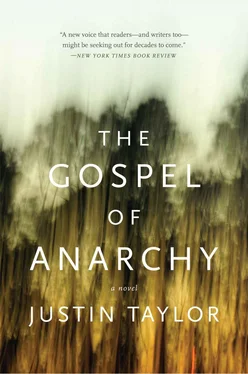“Goddamn, Gene,” the singer says, theoretically to the drummer though he’s talking into the mic and looking out at the audience. “Some weird shit goes down every time we play this fucking town.”
“Ain’t that why we keep coming back?” the drummer says.
“Yer fuckin’ A,” says the singer. “Gaines. Ville. Yer fuckin’ A.”
The crowd goes nuts — just totally apeshit — and the band launches into their take on “Joe Hill’s Casey Jones,” which sets the whole room churning. Fists piston the air, a hundred drunk, sweaty kids shouting themselves hoarse, each believing in their heart that these guys will be so fucking famous soon, and how cool it will be to be able to tell people about having seen them, back when. And Anchor knows these things as well as anyone, but she also knows that if she were in David’s position he’d be going after her right now, so she turns her back on the best punk rock band in the whole Southeast, walks out of the cramped, hot room, wipes sweat from her face with the back of one hand. She looks out the big front windows of the main room for any sign of David in the street. Not seeing him — it makes sense that he wouldn’t stand right in front of the place — she gets a stamp from the bouncer and steps out into the crisp night, looks up and down the road for him walking. Nobody. Nothing. He’s gone. What can she do? Back to the original plan, then; she’ll see him later — after the show ends, and it’s probably almost done. She should go back in and catch the rest of the set. Okay.
Two kickass encores, then the show’s really over. Anchor’s, you know, standing around smoking cigarettes or whatever, when the drummer walks up to her. To her! “Hi,” he says. “I’m Gene.”
“I know,” she says, deadpan — God, she can be a doofus! — and he stares at her, but only for like a second, because then she gets it, says: “I’m Anchor.”
“Where’d you get that name?”
“It’s something my mom used to call me when I was a kid. It just, I don’t know. Stuck.”
“I think it’s cool.”
“Thanks. Great show.”
“Thanks. You coming to the party?”
“What party? Now?”
“Yeah, we have some friends who have this house. On Eighth and Fifth. They call it the Palace of Zinn. Do you know the place?”
“I’ve — heard of it.”
“Well, you should come. I think some other bands are gonna play.”
“Okay.”
“You want to ride with us?”
“Sure.”
So you really can’t blame her for not swinging by Fishgut. There are like a million people there who can take care of David, and she’ll go by tomorrow or something. Everyone knows you don’t pass up a chance to party with the band.
There was this thing that Thomas used to say all the time — quoting someone, she’s pretty sure: You can’t be neutral on a moving train . And how easy would it have been to board that train and go with him? How wonderful and wild and great to just take off? Freedom and danger, a life together, itinerant farm work in the plains states; rail yards and freezing rain.
But when Thomas told her about his plans for them, Seattle, she had known instantly that she wasn’t going with him, that it wasn’t for her. And she’d known, furthermore, that this scheme was his way of offering the love she’d been trying to draw out in him all along, but now that it was hers for the taking she wasn’t sure what to do with it, or if she even wanted it at all. And what did he want from her, anyway? She wasn’t even twenty! She needed time, she said, to figure things out. There’d be other protests, plenty: the national party conventions, the G7, who knew what else. The movement was just getting going; it was going to be around a long time. And also, she was embarrassed to admit it, but what the hell: she liked school.
Poor Thomas! So reticent with his emotions (between explosions, that is), so guarded and exposed at once, so brusque yet so easy to wound. He was inconsolable, and to be honest a little bit scary, stomping his feet, shouting how he was going with or without her; but when she told him that she understood his decision and supported him, he bawled. He doesn’t want my admiration, she remembers thinking. Which was a real shame, because it was all she’d had left to give him, except for farewell sex, which he first turned up his nose at, but in the end wasn’t too proud to accept, and then they were both crying, and then first light punched through the tree cover, and he slung his backpack over his shoulder and walked away in the direction of the highway, leaving her behind, alone in his bed, where she rolled over and drowsed again — the last time she would ever sleep at Fishgut. Summer love!
She had worshipped them — all of them — sort of; what they seemed to stand for, who they seemed to be. She hadn’t wanted to be them, exactly, but had hungered to feel things as powerfully as they did. And then that day came when she shared a dream with Katy, and they found the book and everything, and she actually felt like she had achieved the level they were at, however briefly. And it wasn’t that she hadn’t liked what she found there, or that she retreated out of fear. It was more like — how to phrase this? — even as she had given herself over fully to the experience, there was this other part of her that understood on some deeper level that the experience of the experience was a kind of capstone, not the dawn of a new era, as it clearly was for them. It was for her something fleeting and unknowable glimpsed on the horizon, a trick of the sunset light.
Helping out with the zine had been her going-away present to them, for everything they’d done for her, and because, truly, she wished them only the best. (Also, a good way to work on her design skills. The zine is in her portfolio now.) She loved them: Katy, David, Liz, and the whole messy rest, all the randoms and unknowns, the passers-through and the passing-through itself. She loved the way they talked, especially — how they gave full credence to ultimate concerns, the rhetoric a little windy, sure, but the passion undeniable, the attraction intense. They lived as if the fate of the very universe were perpetually at stake and in their hands.
Earnest Thomas on the one hand with his politics, the holy power trio and their minions on the other. It didn’t take an Introduction to Dialectics (though she happens to be enrolled this semester in a class where they’re giving her one) to see their antithetical positions as halves of a larger singularity: the desire for an encompassing horizon, a totalizing vision, an epistemology sufficient to enclose the whole known world, and account for everything unknown, too. A beautiful dream, impeccable and doomed, but honest — except in that it could never know itself as the parable, the myth it truly was.
But that was all so long ago. A lifetime, twelve months — eons! Think how much has happened since then. The Seattle protests, for example, were a huge success, with rioting and everything. Thomas was arrested on the very first day. He was masked up and helping direct some people who were trying to drive a dumpster through a Starbucks window. They held him for ten days and refused him treatment of a bruised rib and a badly sprained ankle, both courtesy, he said, of an aggressive paramilitary police force in full storm trooper regalia. The charges were dropped for whatever reason — he was small potatoes, or the fact that they had no evidence against him. He was too banged up to try freight-hopping, but managed somehow to stow away on Amtrak, where he befriended a retired couple in the dining car. They bought him all his meals for three straight days while he regaled them with stories, then, when the train rolled into Atlanta, gave him money to buy a Greyhound ticket to “go honest” for the rest of the way home. He thanked them, even hugged them, but pocketed the cash and snuck onto the Greyhound, too, because not taking full advantage of the obliviousness of disgruntled wage slaves was truly an insult to their alienation from their labor. He finally got back to Gainesville on the twentieth of December and hobbled home from the bus station. When he got there he found a burned-out hulk with its fence wreathed in yellow police tape, a Consolidated Properties sign out front, because not even a world-class SOB like Stuckins was going to rebuild from the ground up.
Читать дальше












